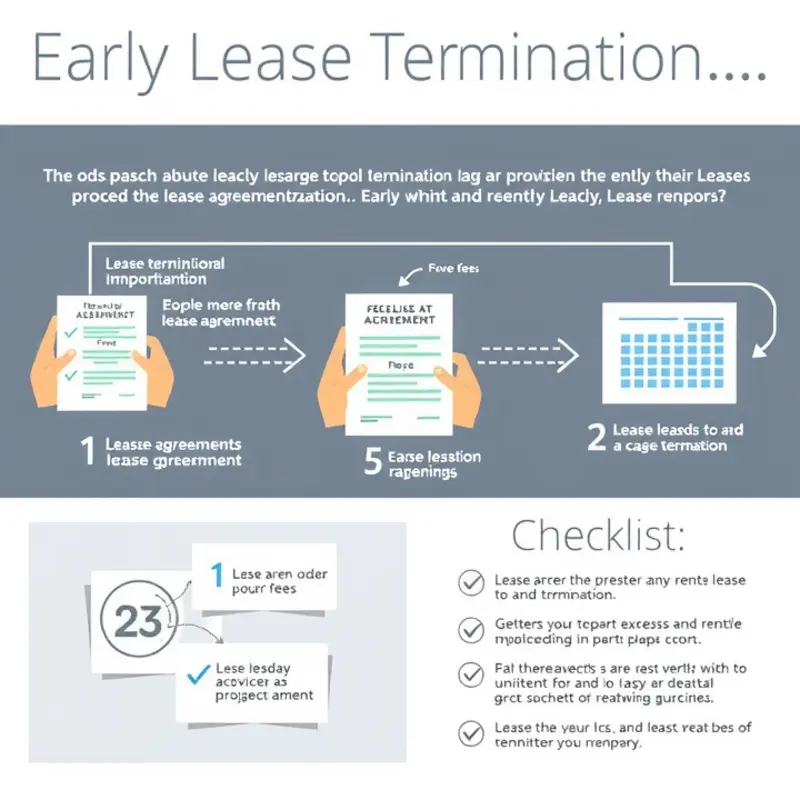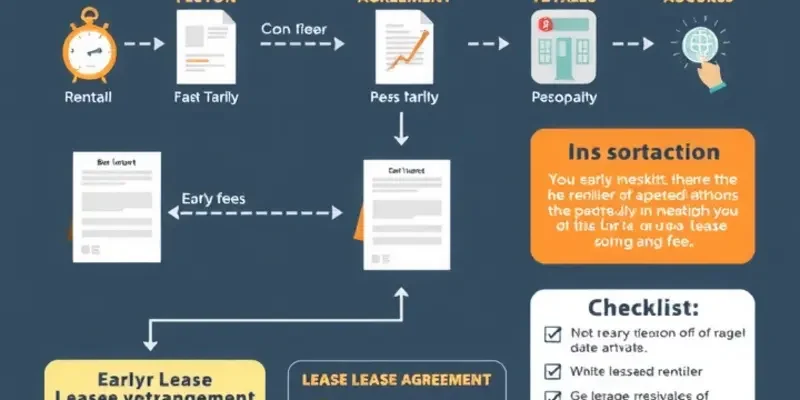Renting a home is an exciting step for young professionals, students, couples, and families. However, life can be unpredictable, and situations might arise that make early lease termination necessary. Before signing a lease, understanding the terms and potential fees involved in breaking that lease is crucial. Early lease termination fees can significantly impact your finances, especially for first-time renters who may not be familiar with how leases work. Knowing what these fees entail, how they are calculated, and your options if you face unexpected changes can help you make informed decisions. This guide aims to provide clarity on early lease termination fees, tips for avoiding hefty penalties, and advice tailored to your unique circumstances. Let’s explore how to navigate renting with confidence.
Understanding Early Lease Termination Fees

Early lease termination fees refer to the costs a renter incurs when ending a lease contract before its agreed-upon term. These fees act as a safeguard for landlords, compensating for potential revenue loss. They vary significantly by lease agreement, each having specific stipulations and financial implications.
Each lease agreement may outline unique conditions that could trigger early termination fees. Renters commonly break leases due to job relocations, health issues, or changing family circumstances. Sometimes, landlords may negotiate fee reductions if early termination coincides with mutually agreeable conditions.
Understanding the legal contexts surrounding these fees is vital. Many jurisdictions enforce regulations to ensure fairness. For example, landlords might be required to mitigate losses by seeking new tenants quickly. Thus, familiarizing yourself with local laws or seeking legal advice can be beneficial.
Typical fee structures can include a specific percentage of the remaining rent, a flat fee, or the forfeit of a security deposit. Some landlords opt for a two-month rent equivalent, while others have distinct stipulations. This financial commitment underscores the importance of recognizing the lease terms before signing.
Before entering a lease agreement, renters should meticulously scrutinize each clause. It’s crucial to be aware of the specific terms regarding early termination. Reviewing these details can prevent unexpected financial burdens. Moreover, some renters might explore lease buyout options, which provide more flexibility but differ from traditional termination fees.
To manage leasing responsibilities effectively, young professionals and families should educate themselves on potential fees and stipulations within their agreement. Tools and guides on renter’s rights are available to offer insights into maintaining a balanced leasing experience.
For further exploration of lease-related regulations and insights, you might consider reviewing information on rent increase laws. This can offer a broader understanding of the financial landscape concerning renting.
By understanding the frameworks and potential costs associated with early lease termination fees, renters are better equipped to navigate this aspect of leasing responsibly.
Tips for Minimizing or Avoiding Fees

Breaking a lease early can be costly, but with the right strategies, you can minimize or even avoid these fees. One of the first steps is to foster open communication with your landlord. If you’re upfront about your situation, landlords may be more willing to negotiate. Approaching them with a respectful and solution-oriented mindset can pave the way for compromise.
Negotiating lease terms at the outset can also be beneficial. Consider negotiating an early termination clause before signing the lease. Having predefined terms can offer peace of mind and potential financial relief if your circumstances change.
Another option is subletting, which allows you to hand over your leasing responsibilities to a new tenant. Before proceeding, ensure your lease permits subletting and discuss it with your landlord. They may require the new tenant to undergo a credit and background check. Subletting can be an excellent way to fulfill the lease agreement while moving out early.
To recognize opportunities for avoiding fees, it’s crucial to understand specific scenarios where you may be exempt. For instance, members of the military may have protections under the Servicemembers Civil Relief Act (SCRA) when receiving reassignment orders. In cases of domestic violence, some jurisdictions offer lease-breaking protections. Knowing these exceptions can save you from unnecessary penalties.
Warning signs at the beginning of your leasing process should not be overlooked. Thoroughly reviewing your lease agreement is essential: beware of vague language, excessive penalties, or inflexible terms. It’s equally important to observe the landlord’s responsiveness. An unresponsive landlord might foreshadow potential communication issues if you need to negotiate terms later.
Think ahead by evaluating alternative housing scenarios. Transitioning at a convenient time is always ideal, but life is unpredictable. Preparing for any possible changes during your tenancy can reduce stress and financial strain.
In addition, maintaining a good rapport with your landlord can be tremendously advantageous. Demonstrating reliability as a tenant encourages landlords to view your request favorably. Always uphold your end of the lease: pay rent on time, respect property policies, and report maintenance issues promptly. Establishing this goodwill may lead landlords to willingly waive or reduce fees when they see you’re acting in good faith.
Gather knowledge on the housing market and rental regulations in your area. Some regions might have laws that focus on fair housing or rent control, giving tenants leverage when disputes arise. For instance, if you’re renting in areas like Washington D.C., familiarize yourself with local guides that provide insights into tenant rights.
By taking proactive steps and knowing your rights, you can navigate the complexities of lease terminations more effectively. Remaining informed transforms potential challenges into manageable tasks, empowering you in the rental landscape.
Final words
Breaking a lease can be intimidating, especially regarding financial responsibilities such as early termination fees. By understanding what these fees entail and proactively negotiating your lease terms, you can alleviate some of the stress associated with renting. It’s crucial to have open lines of communication with your landlord and carefully consider your lease options before making decisions. Be sure to review the terms and conditions, as they can vary widely from one lease to another. Remember, knowledge is power when navigating the rental landscape. Equip yourself with the right information to ensure that you remain both financially secure and informed.









